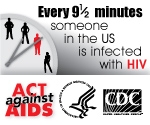CDC Partners
CDC Partnerships
Advisory Committee on Immunization Practices (ACIP)
The ACIP develops recommendations for routine vaccinations and schedules, including frequency, dosage, and any contraindications.
Birth Defects and Developmental Disabilities External Partners Group
A coalition of government and private sector participants who work together to promote child development; prevent birth defects and developmental disorders / disabilities; and enhance the quality of life and prevent secondary conditions among people who are living with mental or physical disabilities, or a combination thereof.
Cancer Partner Profiles
Cancer Prevention and Control Program Partner promote effective cancer prevention and control practices through programmatic implementation and outreach that puts research findings into action in order to achieve mutually beneficial goals.
Clean Hands Coalition
An alliance of public and private partners working to create and support coordinated, sustained initiatives to significantly improve health and save lives through clean hands.
Community Partners for Healthy Farming Intervention Research Program
Implement and evaluate interventions for work-related injuries, illnesses, and deaths in agriculture.
DES Update Partners
CDC works with advocacy and health care provider organizations around the country to research, develop and distribute information about diethylstilbestrol (DES).
Global Health Partnerships
Shape global health policies and fund, implement, and evaluate programs to address shared global health objectives.
Guide to Community Preventive Services
Review and assess evidence on the effectiveness and cost-effectiveness of community preventive health services and develop recommendations.
Healthy Schools, Healthy People—It’s a SNAP
A national recognition program developed by CDC and The Soap and Detergent Association that encourages students to create school-wide programs promoting the role of handwashing and staying healthy.
Integrated Disease Surveillance and Response (IDSR) Partners
Promote the IDSR goals for the WHO African region and provide technical assistance, funding, and resources.
Institute for Healthcare Improvement
The Institute for Healthcare Improvement (IHI) is an independent, not-for-profit organization helping to lead the improvement of healthcare throughout the world. IHI works to accelerate improvement by building the will for change, cultivating promising concepts for improving patient care and helping healthcare systems put those ideas into action. The IHI Open School for Health Professions, a new initiative of IHI, is an interprofessional educational community that gives students the skills to become change agents in healthcare improvement. More information about these free online courses is located at IHI's Open School Web site.
International Micronutrient Malnutrition Prevention and Control Program (IMMPaCt) Partners
Aid countries in building a national capacity to eliminate micronutrient deficiencies.
Lab Response Network Partners
Maintain an integrated network of state and local public health, federal, military, and international laboratories that can respond to bioterrorism, chemical terrorism and other public health emergencies.
National Coalition for Food Safe Schools
This website is a one-stop gateway to school food safety information and resources.
Partners in Information Access for the Public Health Workforce
A collaboration of U.S. government agencies, public health organizations and health sciences libraries to help the public health workforce find and use information effectively to improve and protect the public's health.
Partnership for Food Safety Education
Dedicated to educating the public about safe food handling to help reduce foodborne illness.
Prevention Research Centers
A network of academic researchers, public health agencies, and community members that conducts applied research in disease prevention and control.
Sexually Transmitted Diseases Prevention Partnership
Promotes strategies to reduce the incidence and impact of STDs through support and encouragement of partnerships among the private, voluntary, and public sectors .
Technology Transfer Office (TTO)
The TTO seeks out and works with business partners to help develop new technologies or to translate existing technologies into products or services that improve public health. Technology transfer is wholly focused on translation of CDC's research findings into practical applications for the benefit of health and safety of the American public and the world.
Tuberculosis (TB) Education and Training Network
Brings TB professionals together to network, share resources, and build education and training skills.
Tuberculosis Epidemiologic Studies Consortium (TBESC)
Consortium members strengthen, focus, and coordinate tuberculosis (TB) research and build scientific research capacities.
Page last updated: February 12, 2009
Content source: Division of Partnerships and Strategic Alliances
Content owner: National Center for Health Marketing

